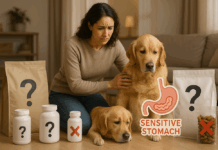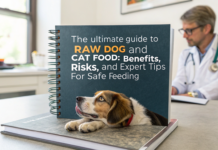Last Updated on April 25, 2024 by Dogs Vets
As a dog owner, it’s crucial to know what foods can pose risks to your furry friend’s health. Certain foods that are perfectly safe for humans can be harmful to dogs, potentially leading to serious health issues. For those who frequently ask, “Can dogs eat this or that?” It’s important to check reliable sources.
12 Foods to Avoid and Their Safe Alternatives
Knowing what not to feed your dog is just as important as knowing the healthy treats you can offer them. Below is a list of common foods that should be avoided and some safe, nutritious alternatives.
1. Chocolate (Alternative: Carob)
Why Avoid: Chocolate contains theobromine and caffeine, both of which are toxic to dogs and can lead to vomiting, diarrhea, rapid heart rate, and even death.
Safe Alternative: Carob is a chocolate substitute that is safe for dogs. It tastes similar to chocolate but lacks theobromine and caffeine, making it a safe treat for your pet.
2. Xylitol (Alternative: Stevia)
Why Avoid: Xylitol, a sweetener found in many sugar-free products, can cause insulin release in dogs, which can lead to liver failure and hypoglycemia.
Safe Alternative: Stevia is a natural sweetener that does not have the harmful effects of xylitol, making it a safer choice for sweetening dog treats.
3. Grapes and Raisins (Alternative: Apples)
Why Avoid: Grapes and raisins can cause kidney failure in dogs, even in small amounts.
Safe Alternative: Apples, without seeds and core, are a safe and healthy alternative, providing vitamin C, fiber, and calcium.
4. Onions and Garlic (Alternative: Carrots)
Why Avoid: Onions and garlic can cause oxidative damage to red blood cells in dogs, leading to anemia.
Safe Alternative: Carrots are a nutritious substitute, offering beta-carotene, fiber, and other vitamins without the risks associated with onions and garlic.
5. Macadamia Nuts (Alternative: Peanuts)
Why Avoid: Macadamia nuts can cause weakness, depression, vomiting, tremors, and hyperthermia in dogs.
Safe Alternative: Peanuts (unsalted and not in the shell) are safe for dogs in moderation, providing healthy fats and proteins.
6. Avocado (Alternative: Peeled Cucumbers)
Why Avoid: Avocado contains persin, which can cause vomiting and diarrhea in dogs.
Safe Alternative: Peeled cucumbers offer similar textures without the harmful effects, plus they are hydrating and low in calories.
7. Alcohol (Alternative: Dog-Specific Beverages)
Why Avoid: Alcohol can cause intoxication, potentially leading to vomiting, diarrhea, decreased coordination, central nervous system depression, difficulty breathing, tremors, coma, or even death in dogs.
Safe Alternative: There are various dog-specific beverages on the market that are safe and enjoyable for dogs, including non-alcoholic beer or wine for dogs.
8. Cooked Bones (Alternative: Raw Bones)
Why Avoid: Cooked bones can splinter and cause choking or serious damage to the dog’s digestive tract.
Safe Alternative: Raw bones, on the other hand, are generally safer as they are less likely to splinter, and they help keep your dog’s teeth clean.
9. Coffee and Tea (Alternative: Safe Herbal Teas)
Why Avoid: Caffeine in coffee and tea can be toxic to dogs, potentially leading to rapid breathing, heart palpitations, and muscle tremors.
Safe Alternative: Herbal teas that are known to be safe for dogs, like chamomile, can be a cozy treat when served cool.
10. Yeast Dough (Alternative: Cooked Bread)
Why Avoid: Yeast dough can rise in your dog’s stomach, causing pain and potentially dangerous gas build-up.
Safe Alternative: Small amounts of plain cooked bread are safe for dogs, without the risks associated with rising dough.
11. Dairy Products (Alternative: Dairy-Free Milks)
Why Avoid: Many dogs are lactose intolerant and can have trouble digesting dairy, which can lead to gastrointestinal upset.
Safe Alternative: Dairy-free milks such as coconut or almond milk can be a suitable alternative, provided they are unsweetened and free from harmful additives.
12. Salt (Alternative: Sodium-Free Treats)
Why Avoid: High amounts of salt can lead to sodium ion poisoning in dogs, symptoms of which include vomiting, diarrhea, tremors, and seizures.
Safe Alternative: Sodium-free dog treats ensure your dog can enjoy a savory snack without the health risks associated with high salt intake.

How You Can Tell if a Food is Unsafe for Your Dog
Identifying whether a food is unsafe for your dog is a crucial aspect of responsible pet ownership. While many foods that are healthy for humans are also safe for dogs, there are notable exceptions that can cause significant health issues.
Here are several strategies and tips to help you determine if a food might be risky for your canine friend:
1. Research Before Feeding: The first and most effective step is always to research before introducing any new food into your dog’s diet. Additionally, always check with your veterinarian if you are unsure about the safety of a particular food.
2. Watch for Toxic Ingredients: Some ingredients are known toxins for dogs. These include chocolate, xylitol, onions, garlic, and grapes. Always read the labels of products you plan to share with your pet, especially processed foods, which might contain these ingredients in some form.
3. Observe Your Dog’s Reaction: After feeding a small amount of a new food, watch your dog closely for any signs of adverse reaction. Symptoms to look out for include:
- Vomiting or diarrhea
- Excessive thirst or urination
- Lethargy or weakness
- Changes in appetite
- Difficulty breathing
- Swelling or hives
These symptoms could indicate food poisoning or an allergic reaction.
4. Know the Commonly Unsafe Foods: Familiarize yourself with a list of commonly known unsafe foods for dogs. These include, but are not limited to:
- Alcoholic beverages
- Chocolate, coffee, and caffeine
- Grapes and raisins
- Macadamia nuts
- Yeast dough
- Foods high in salt and sugar
- Avocado
5. Consider Breed-Specific Sensitivities: Some breeds have specific sensitivities or genetic predispositions to certain health issues that can be exacerbated by particular foods. For instance, breeds prone to obesity should avoid high-calorie treats, while those susceptible to bladder stones may need to avoid certain types of protein or minerals. Consult with your vet to understand if your dog’s breed has any specific dietary restrictions.
6. Opt for Dog-Safe Alternatives: When in doubt, choose foods specifically formulated for dogs or known safe alternatives to popular human snacks. Dog-safe treats often provide similar textures and flavors without the risks associated with human food.
7. Trust Your Vet: Your veterinarian is your best resource when it comes to your dog’s diet. If ever in doubt about a food’s safety, a quick call or visit can provide the necessary guidance and peace of mind.
By keeping informed and vigilant, you can protect your dog from foods that might harm them. Always err on the side of caution and opt for dog-safe alternatives that ensure your pet enjoys their treats without any health risks.
Remember, what works for humans does not always translate safely to canine diets, and keeping informed through reliable resources can make all the difference in maintaining your dog’s health and happiness.
Conclusion
Understanding what foods to avoid feeding your dog is essential for their health and well-being. By substituting dangerous foods with safe and healthy alternatives, you can ensure that your pet enjoys their meals and treats without any risk.
Always consult your veterinarian before introducing new foods into your dog’s diet, and keep an eye on their reaction to new treats.
Facts Check
We hope you enjoyed this article… What are your thoughts?
Please feel free to share this article!
We strive to provide the latest valuable information for pet lovers with accuracy and fairness. If you would like to add to this post or advertise with us, don’t hesitate reach us.























